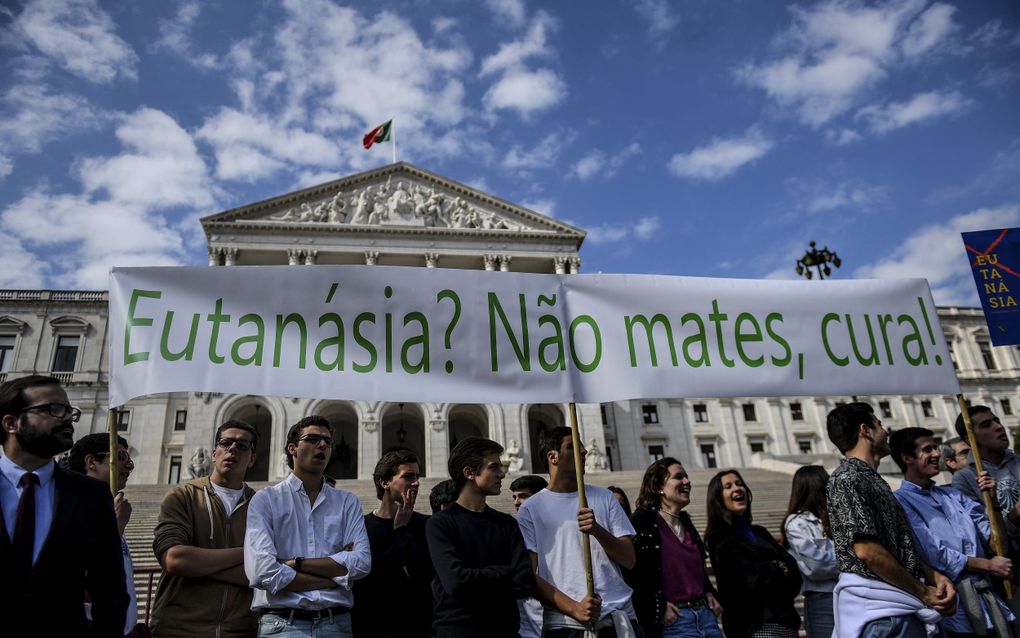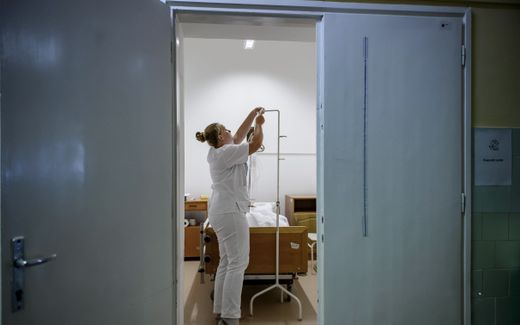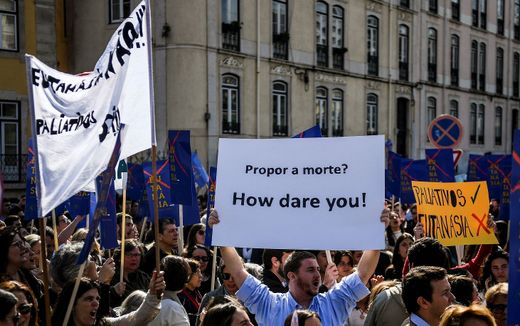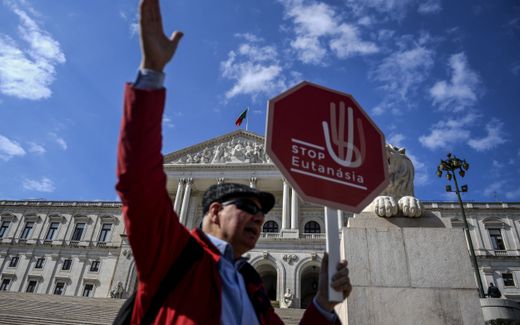Critical responses to Portuguese legalisation of euthanasia

Youngsters hold a banner reading "Euthanasia? Don't Kill, cure!" during a protest against the decriminalization of euthanasia in front of the parliament in Lisbon. Photo AFP, Patricia de Melo Moreira
Southern Europe
Last week, the Portuguese Parliament approved end-of-life legislation. That means that assisted suicide and euthanasia are now decriminalised. However, not all responses are positive.
The Portuguese Episcopal Conference (CEP) expresses its sadness after the vote on the proposal. That is reported by Ecclesia. The CEP consists of Catholic bishops. They wrote a statement asserting that “euthanasia and assisted suicide constitute serious threats to humanity.” The bishops say to realise that amendments can still be made to the proposal but argue simultaneously that “with this legalisation, the fundamental ethical principle that translates into the prohibition of intentionally causing death is broken.”
The CEP is especially worried about the removal of the clause that “guarantees the right balance between the protection of life and respect for the autonomy of the patient”, Ecclesia writes. The bill that was passed legalises a self-determined death not only in the case of terminal illness but also in other situations. The Portuguese bishops are afraid that self-determined death is now promoted as a solution “for people suffering from illnesses whether in a terminal phase or not, or due to serious disabilities.” Instead, they propose that society invest in palliative care that involves “comfort care and love, restores hope and dignifies human life until its natural end.”
Burden
Catholic jurists and doctors are also concerned about the new legislation. Therefore, they appeal to the President of Portugal, Ecclesia writes.
According to the Association of Catholic Jurists (AJC) and the Association of Portuguese Catholic Doctors (AMCP), the proposal that was passed is a “break” of a civilisational principle and clearly broadens indications for euthanasia. They published a statement which reads that the new law also extends euthanasia to cases “which would be compatible with life for many years.” The associations are concerned that Portugal will be a country with one of the most permissive legal systems. They argue this is dangerous, as patients might feel that “society now sees them as a heavy burden.”
In the statement, the Catholic jurists and doctors re-assert their opposition against the legalisation of self-determined death and point out that the prohibition of killing is at the base of the Portuguese legal order. Therefore, they argue that euthanasia and assisted suicide are not medical acts.
Veto
Furthermore, Inês Quadros, the vice-president of the AJC, said that this legislation is a tragedy, Ecclesia writes. She called it “culpable ignorance: knowing that this exists, allowing it to happen.” According to Quadros, it is evident that the Constitution includes the right to life. “Without life, there is no freedom”, she adds. Therefore, she says that the argument of freedom, often used in favour of self-determined death, is false. “It is a group of people with some coldness and distance who validate or authorise this request.” Quadros said to hope that the Portuguese president will veto the bill, as he did before.
Right
The Inter-Religious Work Group on Religions-Health (GTIR) said in a statement that the Portuguese parliament “created a discard culture and broke the dike of life.” The GTIR consists of several religions, such as the Portuguese Evangelical Alliance, the Portuguese Hindu Community, the Lisbon Islamic Community and the Catholic Church, Ecclesia writes.
The in total nine religious communities, see the approval of the self-determined death bill as an “offer of death to patients in severe suffering and the end of life as a way out.” Instead, they plead for “building compassionate societies capable of not pushing anyone out of the boat of life, but accompanying them to the end.”
According to the religious groups, killing cannot be a right, much less than the “duty to kill”, as only “life is a source of right”, the statement reads.
Related Articles






